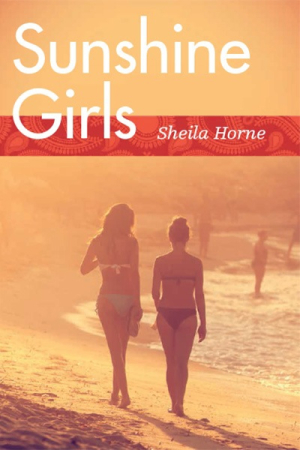Sunshine Girls
The social movements of the 1970s make a perfect backdrop for this coming-of-age story of four young women.
Four twentysomething girlfriends navigate changing social mores and complicated love lives in 1970s Toronto. In Sheila Horne’s debut novel, Sunshine Girls, twenty-two-year-old Ella Shaw feels depressed and adrift, but with the help of her four friends—at home in Toronto and on weekend getaways to Wasaga Beach—she learns to stretch the boundaries of experience but soon finds that risk-taking bears consequences.
Ella thought she would be married by now; instead, the man she gave up college to be with has impregnated another woman. A typist for General Insurance, Ella leans on her girlfriends for support. Her colleague Jessie is an enthusiastic drinker and pot smoker; Raynie is a foul-mouthed party girl who seduces married men; Meg is conservative but ready for romantic adventure.
Horne brings her story to life with vivid period detail. When Ella and her new boyfriend, Peter, travel to Vancouver, they encounter typical vegetarian, draft-dodging hippies who propose a California commune. Moreover, the book opens at a dance with the Bee Gees’s “To Love Somebody” playing, and Ella references the Beatles’s “With a Little Help from My Friends,” a perfect reflection of the primacy of friendship in the novel. She also reads two feminist classics, Betty Friedan’s The Feminine Mystique and Erica Jong’s Fear of Flying.
However, traditional values were still influential in the 1970s. Although liberated Raynie might celebrate “what-the-heck sex,” other voices advocate modesty. When Ella finds herself pregnant, her worrywart mother and prim great-grandmother disapprove of her choices: “no one has a baby by themselves, it’s just not done,” Grams objects. Yet Ella believes she can embark on education and motherhood without a partner. “It’s not the Victorian age,” she declares. “It’s 1973, haven’t you heard? You don’t have to sacrifice your life.” Horne ably captures this pivotal time of changing gender roles.
Ella is a spirited, sympathetic narrator trapped between two value systems, as well as between adolescence and adulthood. At times, her friends can seem one-dimensional (the pothead, the tramp, the good girl), but their banter is spot-on. After a drinking binge, Ella’s cry of “Oh God, I think I’ve blown out my liver” merits Raynie’s sarcastic rejoinder: “You’re just hungover, dummy.” Yet humor is balanced with thoughtful lines like, “we spent a night in a decrepit motel. The room reeked of transience.”
It would have been easy for Horne to ignore the men in a primarily female narrative, but, in fact, there are many strong male figures, including aspiring screenwriter Peter, Ella’s homosexual coworkers, her compassionate boss (father of five daughters), and her mother’s boyfriend, Ralph. The author’s generosity with her characters even extends to Tom, the man who comes to fix the Wasaga Beach cottage toilet; despite only appearing for a few pages, he gets a full backstory.
A slightly abrupt ending detracts only slightly from the success of this sensitive, nostalgic coming-of-age novel. Sexual content earns it the New Adult rather than Young Adult designation. Sunshine Girls is like a sweeter, more innocent version of Lena Dunham’s HBO hit, Girls, and it will appeal to fans of TV’s Mad Men or Meg Wolitzer’s The Interestings.
Reviewed by
Rebecca Foster
Disclosure: This article is not an endorsement, but a review. The publisher of this book provided free copies of the book and paid a small fee to have their book reviewed by a professional reviewer. Foreword Reviews and Clarion Reviews make no guarantee that the publisher will receive a positive review. Foreword Magazine, Inc. is disclosing this in accordance with the Federal Trade Commission’s 16 CFR, Part 255.

